AI chatbots have become popular tools for homework help in 2025, offering support across subjects like math, science, writing, and more. Here are the top options:
- ChatGPT: Offers step-by-step explanations for a wide range of subjects. Freemium model with premium perks.
- Khanmigo: Acts as a virtual tutor, guiding students through problems without giving direct answers. $9/month subscription.
- Socratic by Google: Free app for grades 7–12, focused on visual learning and curated resources.
- QuizCat AI: Gamified quizzes for middle and high school students. Freemium, with premium plans starting at $2.99/week.
- Otter.ai: Transcription and note-taking tool for lectures and group discussions. Free tier available; Pro plan at $8.33/month.
- Elicit: Research assistant for analyzing academic papers, ideal for STEM and college-level research. Free to use.
- Wolfram Alpha: Best for math and data-heavy subjects, offering free tools and a Pro subscription for advanced features.
Each tool has strengths tailored to specific needs, from creative writing to advanced research. Combining multiple chatbots can maximize their effectiveness.
How Students Are Using AI For Homework: But How Good Is ChatGPT At School? | Talking Point
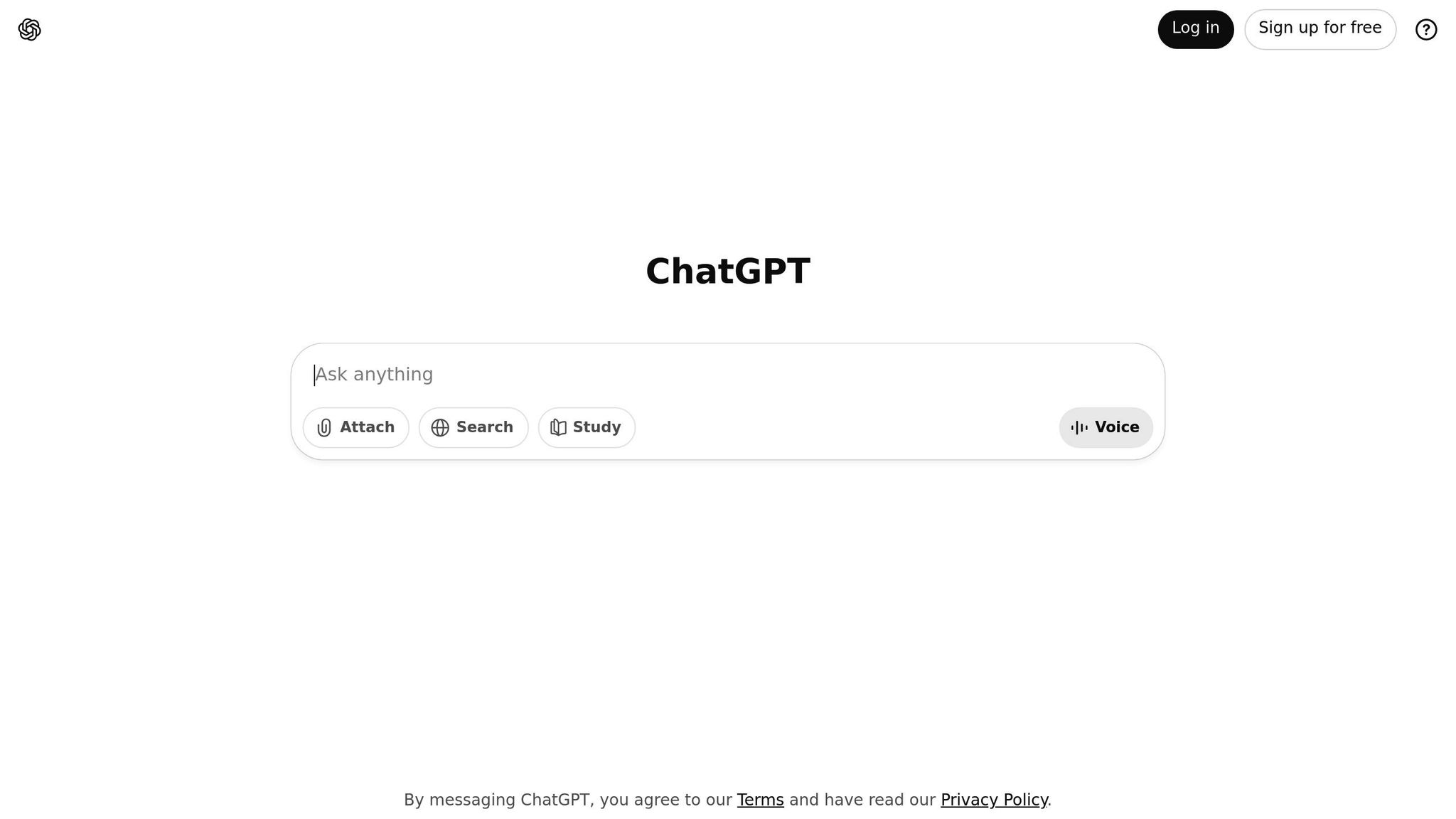
1. ChatGPT
ChatGPT serves as a helpful companion for American students tackling their homework. This conversational AI simplifies tough subjects by breaking them into easy-to-follow steps.
Subject Coverage
ChatGPT covers a wide range of topics:
- Math: Offers step-by-step guidance to solve problems.
- English: Helps with brainstorming ideas, improving grammar, and refining writing.
- Science: Explains concepts clearly using relatable examples.
- History and Civics: Provides context and explanations for historical events and civic topics.
- Foreign Languages: Assists with basic language practice for beginners.
Pricing
ChatGPT operates on a freemium model. The free version delivers a robust range of homework assistance, while a premium subscription unlocks perks like priority access and faster response times - ideal for those seeking more reliable support.
Accessibility
You can use ChatGPT on smartphones, tablets, and laptops, making it easy to access anytime, anywhere. It supports both text and voice inputs, offering flexibility for different learning preferences.
Education Level Suitability
Whether you’re a younger student needing simple explanations or a high school or college learner looking for more detailed support, ChatGPT adjusts its responses to meet your needs.
Up next, let’s explore Khanmigo, another tool pushing the boundaries of educational technology.
2. Khanmigo
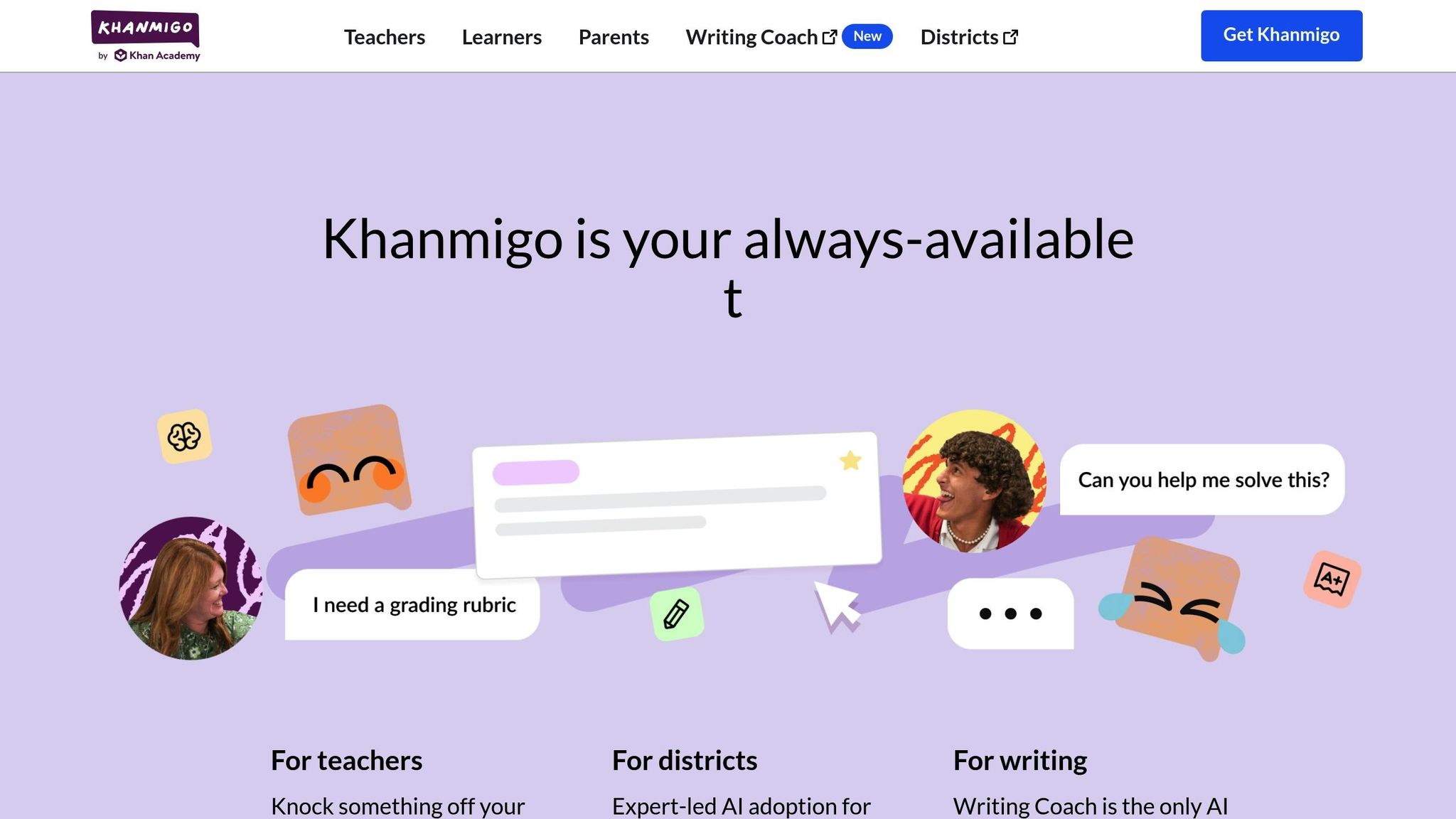
Khanmigo is Khan Academy's AI-powered virtual tutor, designed to guide students through problems while encouraging independent learning. Instead of giving direct answers, it prompts students with thoughtful questions, helping them build problem-solving skills.
Subject Coverage
Khanmigo supports a wide range of subjects, offering tailored guidance in key areas:
- Mathematics: From basic arithmetic to advanced calculus, it walks students through problems, clarifying the concepts behind each step.
- Science: Covers biology, chemistry, physics, and earth science with interactive visuals to make complex ideas easier to grasp.
- Reading and Writing: Assists with essay feedback, reading comprehension, and even creative writing projects.
- Computer Programming: Introduces coding basics in Python and JavaScript through hands-on exercises.
- SAT Prep: Provides focused practice for students preparing for college entrance exams.
What sets Khanmigo apart is its refusal to offer direct solutions. It mirrors the approach of a skilled tutor, asking probing questions that guide students to uncover answers on their own.
Pricing
Khanmigo is available for a subscription of $9 per month for individual students. This subscription grants unlimited access to the AI tutor across all subjects and grade levels. Additionally, Khan Academy partners with select schools and districts to offer free access, ensuring affordability and accessibility for students from diverse economic backgrounds.
This pricing model aligns with Khan Academy's mission to make education affordable, especially when compared to traditional tutoring rates, which typically range from $30 to $80 per hour.
Accessibility
Khanmigo is accessible via web browsers on various devices, including Chromebooks, which are widely used in U.S. schools. It integrates seamlessly with Khan Academy's courses, allowing students to move between video lessons and AI tutoring within the same platform.
The inclusion of Khan Academy's library of diagrams, charts, and interactive exercises makes it particularly effective for visual learners, enhancing engagement and understanding.
Education Level Suitability
Khanmigo tailors its guidance to suit different educational levels. For elementary students, it provides simplified explanations and supportive language, while high school students are challenged with more advanced reasoning tasks. The AI also identifies when students struggle with foundational skills, suggesting prerequisite material for review. Students can bookmark difficult problems to revisit them later with continued support.
For those tackling college-level coursework, Khanmigo offers advanced strategies and connects ideas across disciplines, fostering the analytical thinking required for success in higher education.
Next, we’ll take a closer look at Socratic by Google and its approach to visual learning.
3. Socratic by Google
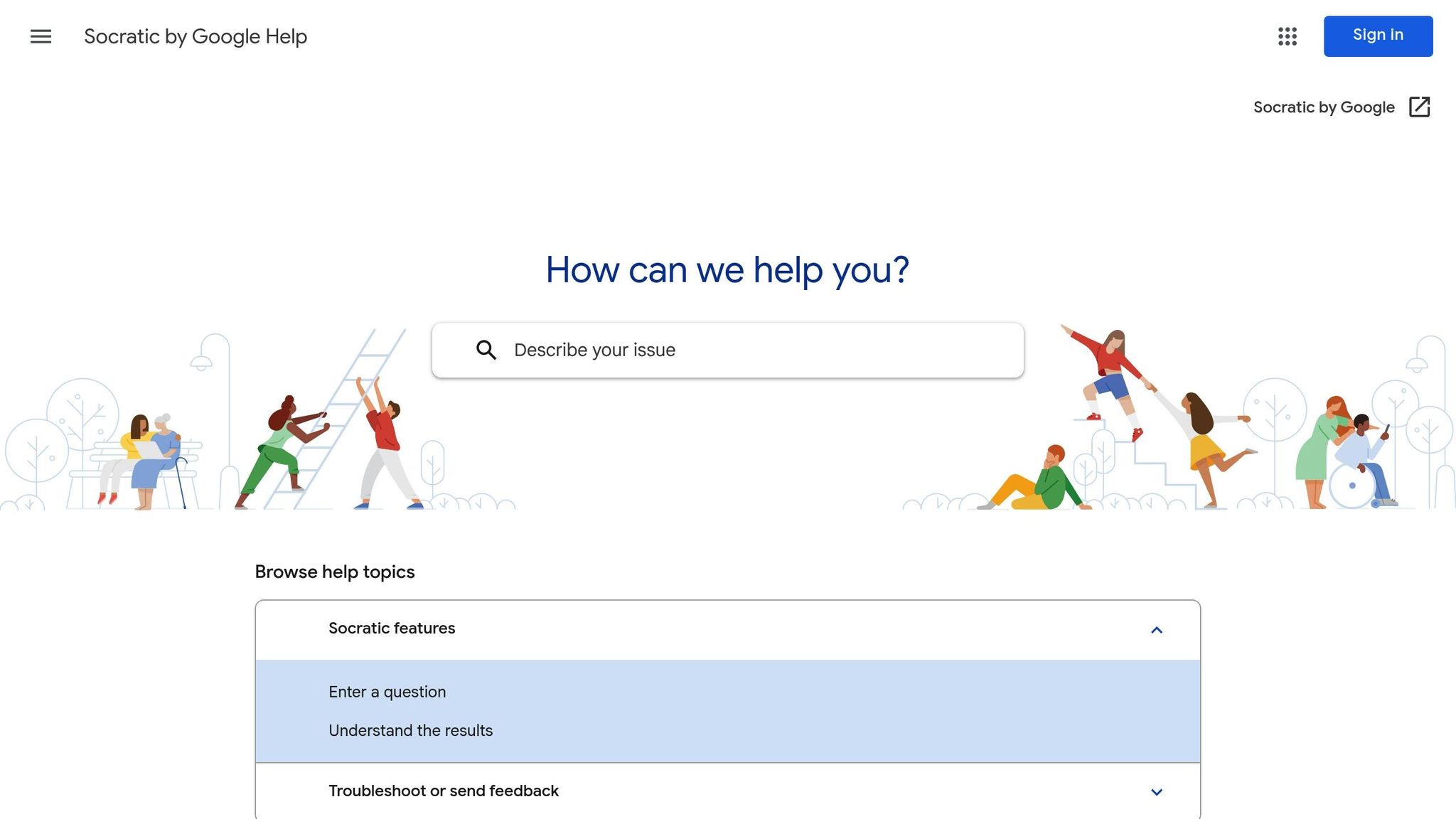
Socratic by Google is a mobile app designed to help students in grades 7–12 tackle their homework with ease. It’s not just about finding answers - it’s about encouraging students to think critically and show their reasoning as they work through assignments.
Learning Experience
Socratic offers explanations in various formats, including text, images, videos, and audio, making it easier for students to understand challenging topics. It simplifies the research process by narrowing down search results to a curated list of relevant resources, saving time and reducing the risk of sifting through unnecessary information. However, it’s worth noting that some of these resources may not include full accessibility features.
Pricing
Here’s the best part: Socratic by Google is completely free. Students can access high-quality homework assistance without spending a dime.
Up next, take a look at QuizCat AI’s gamified approach to interactive learning.
4. QuizCat AI
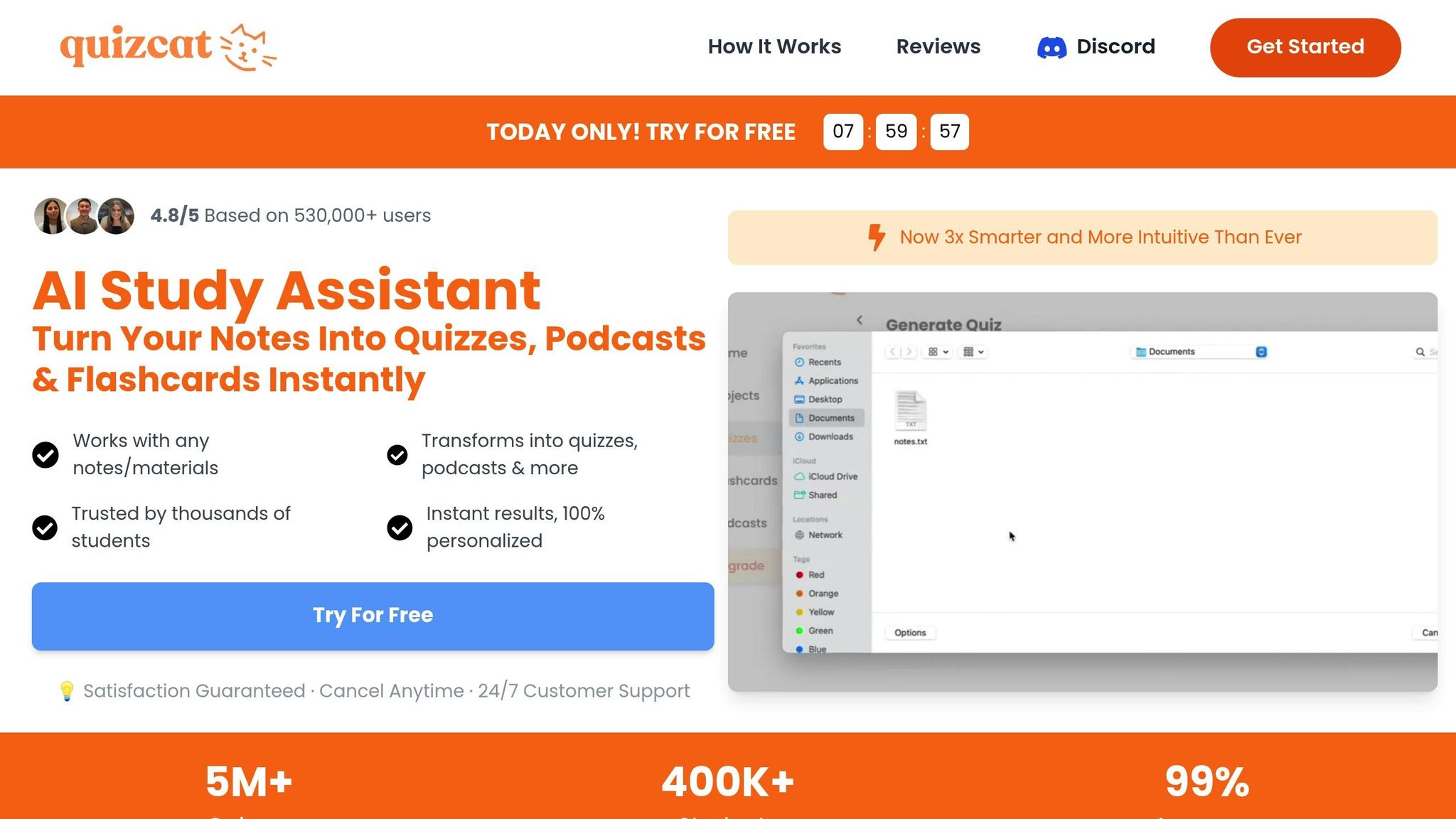
QuizCat AI offers a fun, interactive way to tackle homework through quiz-based learning. It supports a wide range of subjects, making it a versatile tool for students.
Subject Coverage
This chatbot focuses on core subjects like math, science, history, and language arts. Its interactive quizzes are designed to keep students engaged while reinforcing their understanding of key concepts.
Pricing (US$)
QuizCat AI operates on a freemium model. You can download the app for free and access basic homework help. For more features, there's QuizCat+, which offers subscription plans: weekly for $2.99, monthly for $6.99, or annually for $69.99 (which breaks down to about $5.83 per month).
Accessibility
One standout feature is its offline functionality, allowing students to study without an internet connection. However, the app is currently exclusive to Apple devices, including iPhones, iPads, Macs with M1 or newer chips, and Apple Vision.
Education Level Suitability
With its gamified learning approach, QuizCat AI is especially suited for middle and high school students. College students might find it helpful for revisiting basic concepts, but it’s not designed for more advanced college-level material.
Next, we’ll dive into Otter.ai’s transcription tools to see how they can complement your study sessions.
sbb-itb-212c9ea
5. Otter.ai
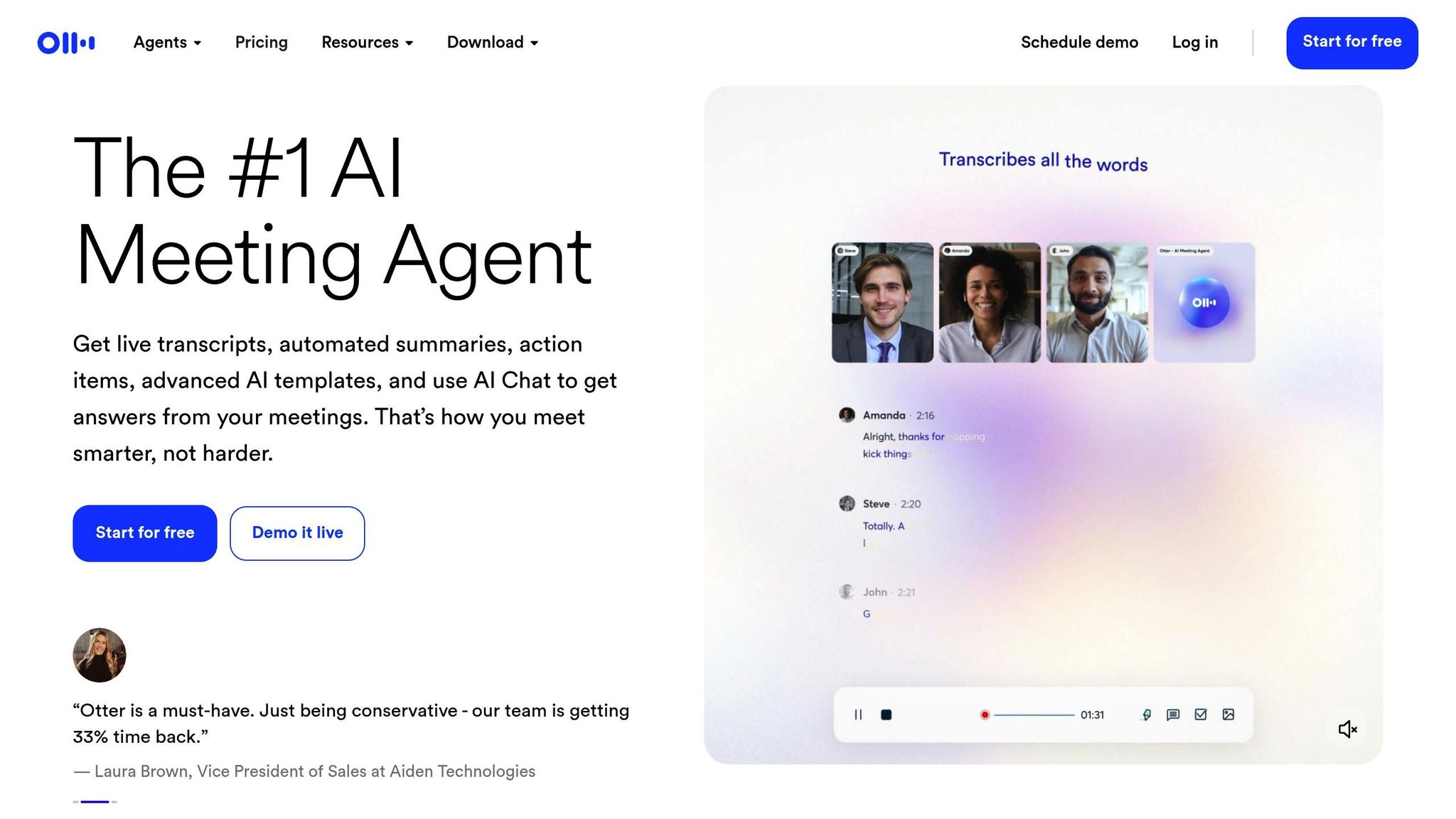
Otter.ai stands out as a tool designed for transcription and note-taking, making it a helpful resource for students needing to capture and organize verbal explanations. While it’s not a traditional chatbot, its ability to convert spoken content into structured, searchable notes sets it apart as an academic support tool.
Subject Coverage
Otter.ai is versatile, transcribing audio from lectures across a wide range of subjects. Whether it’s a history lecture, a science lab discussion, or a foreign language practice session, the platform turns spoken words into searchable text. This feature is especially useful for students who process information better through listening or need to revisit verbal explanations from teachers or group discussions.
The real-time transcription function is a standout feature. As words are spoken, they appear on the screen, allowing students to follow along during fast-paced lectures or conversations without missing key points.
Pricing (US$)
Otter.ai offers options for different needs:
- Free tier: Includes 600 minutes of transcription per month, which is often enough for light academic use.
- Pro plan: Costs $8.33 per month (billed annually) and provides 6,000 minutes of transcription monthly, along with features like custom vocabulary and improved accuracy.
- Business plan: Priced at $20.00 per month (billed annually), this option includes team features but is typically more than what individual students require.
Accessibility
Otter.ai is highly accessible, working across smartphones, tablets, and computers with apps available for both iOS and Android. You can record audio directly through the app or upload files from other sources. Thanks to cloud-based storage, transcriptions sync seamlessly across devices, letting you record on your phone during class and review the notes later on your laptop.
One drawback is the need for an internet connection to enable real-time transcription. However, this same cloud-based feature ensures your content is always accessible across devices.
Education Level Suitability
Otter.ai is particularly useful for high school and college students attending lectures, participating in study groups, or conducting research interviews. Graduate students also benefit from its ability to transcribe interviews or record their own thoughts while working on their theses.
The tool’s ability to distinguish between speakers makes it an excellent choice for group study sessions, ensuring clarity when reviewing collaborative discussions.
Next, we’ll dive into Elicit and its approach to research-based homework assistance.
6. Elicit
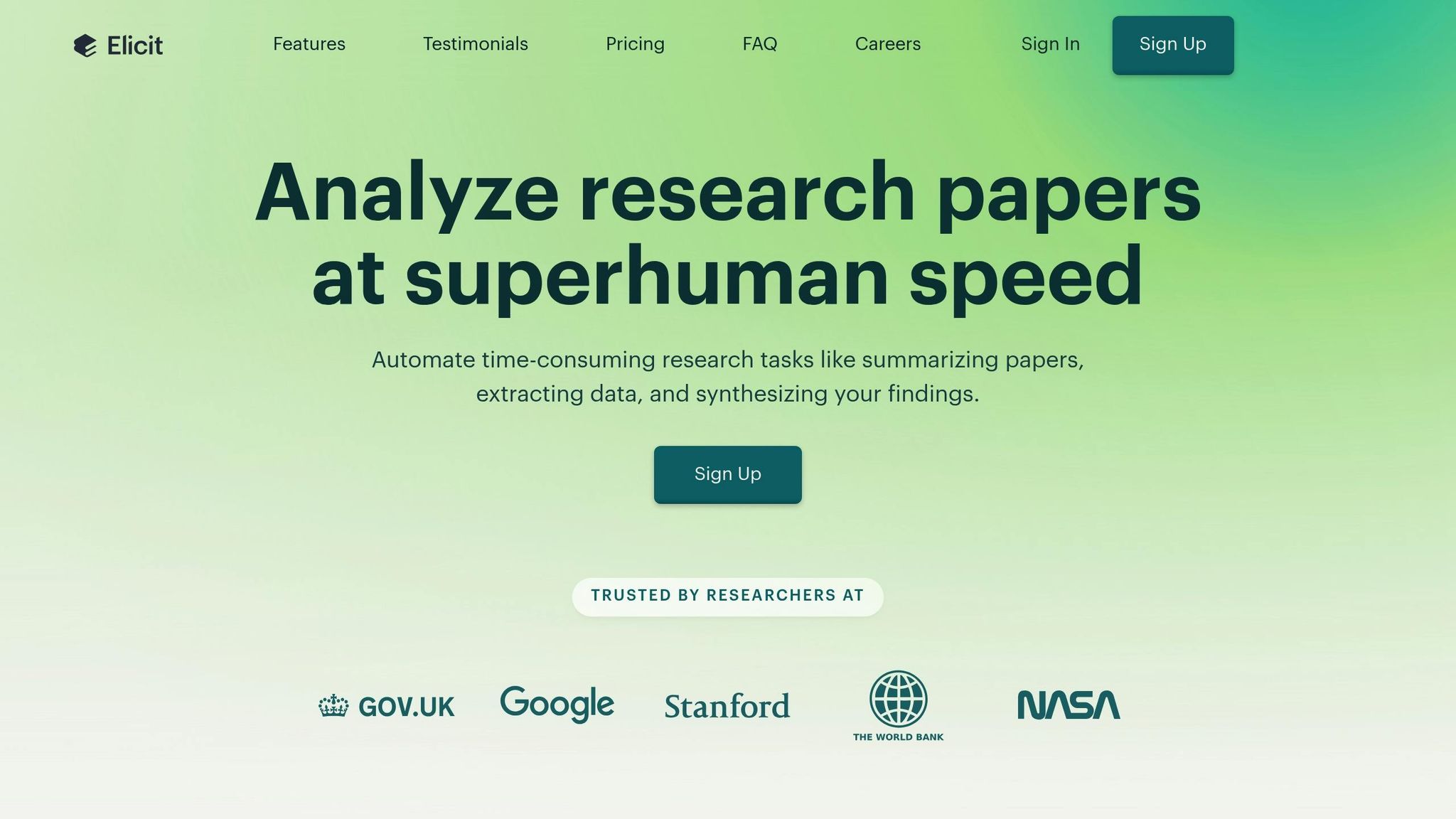
Elicit serves as an AI-driven research assistant designed to deliver evidence-based answers by analyzing scholarly papers. Unlike many chatbots, it doesn't generate responses from scratch but bases them on rigorous academic research.
Subject Coverage
Elicit focuses on academic research, searching through a vast database of 125 million scholarly papers from the Semantic Scholar corpus, which spans all academic fields [5,7]. The platform is particularly effective in empirical domains - fields that rely on experiments and measurable results. As noted on Elicit.com, "Elicit tends to work best for empirical domains that involve experiments and concrete results. Such research is prevalent in biomedicine and machine learning". This makes it a great resource for students tackling science projects, medical research, or data analysis tasks.
However, Elicit is less suited for theoretical or non-empirical disciplines. It only provides information documented in academic papers, which means it may not be as helpful for students seeking general knowledge or working on purely theoretical assignments. Its creators have specifically tailored the platform for STEM audiences, leaving areas like the humanities, arts, and social sciences less comprehensively covered.
Pricing (US$)
Elicit follows a freemium model, offering its core features for free. This allows students to explore its research capabilities without any upfront cost.
Accessibility
Elicit is a web-based platform requiring a stable internet connection to function fully, as it performs real-time searches through its academic database. While it lacks dedicated mobile apps for iOS or Android, its web interface is accessible on laptops, tablets, and smartphones. This ensures consistent access for students and researchers, though offline functionality is limited.
Education Level Suitability
Elicit is most beneficial for college and graduate students engaged in research-heavy coursework. It’s particularly useful for tasks like writing research papers, conducting literature reviews, or developing thesis projects. Advanced high school students, especially those in Advanced Placement courses or working on science fair projects, may also find it valuable.
The platform has received positive feedback from academic professionals for its accuracy and reliability. James Compagno, Director of Marketing at MicroGenDX, highlights its strengths:
"Elicit is a step above other tools I've tried. I prefer Elicit when it comes to actually interpreting evidence. It doesn't make things up like ChatGPT".
Next, we’ll look at how Wolfram Alpha takes a different approach to assisting with homework and research.
7. Wolfram Alpha
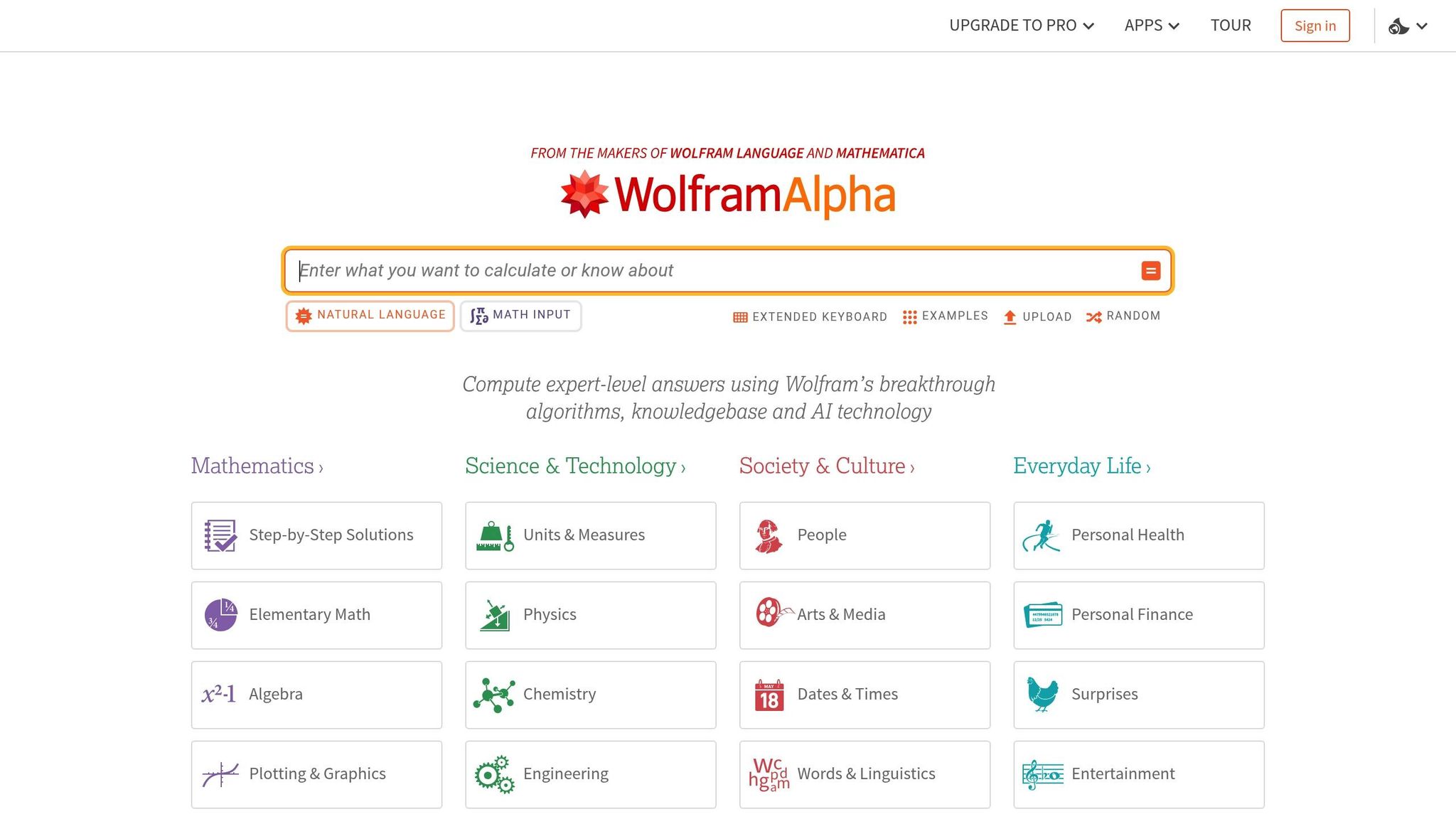
Wolfram Alpha stands apart by focusing on mathematical calculations and data analysis rather than conversational interactions.
Subject Coverage
Wolfram Alpha shines in areas like algebra, calculus, geometry, number theory, discrete math, and advanced mathematics, offering real-time computational solutions. It also provides strong support for chemistry and physics, allowing users to input chemical equations, physics formulas, or scientific data to receive detailed explanations and results. While excellent for quantitative analysis and computational tasks, it’s not the go-to tool for creative writing or literature-related work.
Pricing (US$)
Wolfram Alpha operates on a freemium model. Its core computational tools are free for personal, noncommercial use. For advanced features and an ad-free experience, users can subscribe to Wolfram Alpha Pro. Discounts are available for students and educators at accredited institutions or approved homeschool programs.
Accessibility
To use Wolfram Alpha, you’ll need a stable internet connection and a web browser. The platform is accessible via dedicated mobile apps for iOS and Android, as well as through mobile and desktop web browsers. It supports multiple languages and includes an extended onscreen keyboard for entering special characters and technical formatting. Users can adjust settings like unit systems, currency, and time zones. However, since it’s web-based, it cannot be accessed offline. These features make it a flexible tool for various educational needs.
Education Level Suitability
Wolfram Alpha caters to learners at all levels, from kindergarten to graduate studies. Elementary students can use it for basic arithmetic and simple word problems, while high school students benefit from its capabilities in algebra, geometry, and introductory calculus. College and graduate students can take advantage of its advanced mathematical functions, statistical tools, and scientific computations for complex research and coursework. Its step-by-step solutions are particularly helpful in teaching the problem-solving process, not just delivering final answers.
Strengths and Weaknesses
Each AI chatbot brings its own set of strengths and limitations, making it easier for students to choose the one that fits their specific needs. The table below highlights the key features and drawbacks of each tool for quick comparison.
ChatGPT shines in creative writing and detailed subject explanations but can sometimes produce errors due to outdated information. Khanmigo offers tailored tutoring and promotes critical thinking through its integration with Khan Academy content, though it’s not widely available. Socratic by Google excels in visual learning by using photo recognition and breaking down problems effectively, but it primarily caters to high school-level content. QuizCat AI engages users with gamified quizzes to encourage active learning, though its scope is limited to quizzes and lacks broader homework support. Otter.ai is great for transcription and organizing searchable notes but doesn’t provide much help with problem-solving. Elicit is powerful for advanced research and literature reviews but can feel overwhelming for users unfamiliar with its interface. Lastly, Wolfram Alpha offers exceptional computational capabilities and detailed math solutions but is mainly useful for quantitative subjects, leaving creative tasks out of its reach.
| Chatbot | Key Strengths | Main Weaknesses |
|---|---|---|
| ChatGPT | Versatile across subjects; great for creative writing and detailed explanations | May produce inaccurate information; lacks real-time updates |
| Khanmigo | Personalized tutoring; promotes critical thinking; integrates with Khan Academy | Limited availability |
| Socratic by Google | Strong visual recognition; effective problem-solving; mobile-friendly | Focused on high school content; limited subject coverage |
| QuizCat AI | Gamified quizzes; encourages active learning | Narrow focus; lacks comprehensive homework support |
| Otter.ai | Accurate transcription; searchable, organized notes | Minimal problem-solving capabilities |
| Elicit | Advanced research and literature review tools; scholarly analysis | Complex interface; not beginner-friendly |
| Wolfram Alpha | Excellent computational power; detailed math solutions | Limited to quantitative subjects; not suitable for creative tasks |
These tools cater to the diverse needs of U.S. students looking for effective homework solutions. When it comes to pricing, ChatGPT and Socratic offer free versions with optional upgrades, while Wolfram Alpha provides robust free tools for math-heavy tasks. For broader academic support, ChatGPT and Khanmigo are great options. On the other hand, Wolfram Alpha and Elicit specialize in specific areas like calculations and research. Students might use ChatGPT for writing projects, Wolfram Alpha for math problems, and Otter.ai for organizing lecture notes. While Socratic and QuizCat AI are straightforward and user-friendly, mastering tools like Elicit and Wolfram Alpha requires a bit more time and effort.
Final Thoughts
When choosing an AI chatbot, consider your academic goals, budget, and preferred learning style. Tools like ChatGPT offer both free and premium plans, making it versatile for tasks like writing help or breaking down complex science topics. If you're watching your spending, free versions are a great starting point, while premium features can provide added benefits for those willing to invest.
Your learning style also plays a big role. For example, Socratic uses photo recognition to guide you through problems step by step, Khanmigo acts like a personal tutor, and QuizCat AI turns learning into a fun, quiz-based experience.
Practical considerations matter, too. Take time to review privacy policies and how each tool handles your data. Some tools may also integrate better with your existing accounts or systems, so keep that in mind.
Choosing the right chatbot often depends on the subject you're tackling. Wolfram Alpha is ideal for STEM topics, ChatGPT excels in writing and general assistance, Elicit shines for literature reviews, and Otter.ai is a go-to for transcription and organizing notes.
Many students find success by combining tools. For example, they might use ChatGPT for broad academic help, Wolfram Alpha for solving math problems, and Otter.ai to keep their notes in order. This approach allows you to take advantage of each platform's strengths.
Ultimately, these AI chatbots work best as study aids, offering clear explanations and step-by-step support. However, they should complement - not replace - active studying, which is key for truly mastering any subject.
FAQs
How can I find the best AI chatbot to help with my homework?
When selecting an AI chatbot for homework help, prioritize accuracy, broad subject coverage, and user-friendly design. The ideal tool should offer personalized, step-by-step guidance while supporting a variety of subjects to suit your academic requirements.
Check if the chatbot provides quick and dependable responses, functions smoothly across your favorite devices, and aligns with your learning preferences. Take time to read user reviews and test features like its ability to adjust to different grade levels or specific topics. Choose a platform that simplifies studying and reduces stress.
What privacy concerns should I be aware of when using AI chatbots for homework help?
When turning to AI chatbots for homework help, keeping privacy in mind is essential. These tools can pose risks, such as exposing or misusing personal data, especially since many don’t have strong protections in place. This issue becomes even more critical for younger users, as rules surrounding AI in education are still developing.
To protect your privacy, choose chatbots that emphasize data security, clearly outline their privacy policies, and follow applicable regulations. Also, avoid sharing personal details that aren’t necessary when using these tools. By staying cautious and informed, you can enjoy the benefits of AI-assisted learning while reducing privacy concerns.
Can AI chatbots fully replace traditional tutors, or are they better as learning supplements?
AI chatbots work best as support tools rather than outright substitutes for traditional tutors. They’re great for providing quick answers, personalized assistance, and managing repetitive tasks. However, they fall short when it comes to offering the emotional connection, encouragement, and deep understanding that only human tutors can provide.
Experts suggest integrating AI chatbots into traditional teaching methods to boost efficiency and engagement, all while maintaining the human interaction that’s so important for a balanced learning experience.



